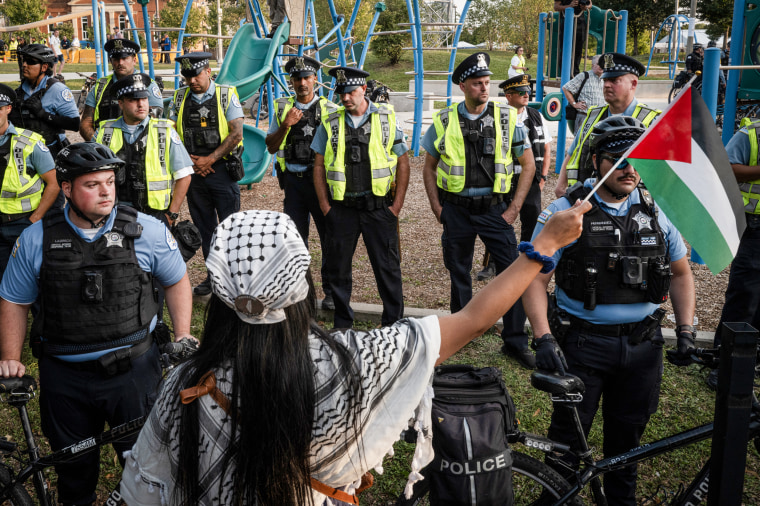Before the Democratic National Convention kicked off, a big question on my mind was, “How is the party going to address the crisis in the Gaza Strip?” We now have an answer: by sweeping it under the rug.
Over the course of four days of lively speeches — infused with an extra excitement around Vice President Kamala Harris’ emergence as the unexpected party nominee — the Biden administration’s backing of Israel’s barbarous military operation in the Gaza Strip rarely came up. It reflects a gamble by the Democratic Party that it can win the election by snubbing the movement objecting to it, by pretending that the U.S. is not supplying munitions used in atrocities.
It’s hard to conclude anything other than that in the Democratic establishment’s eyes, Israeli lives matter more than Palestinian lives.
Despite a constant refrain about standing up for the little guy, calls for the protection of Palestinian civilians were all but absent. Despite all the rhetoric about a big tent, speakers and programming ignored the thousands of protesters outside the convention calling for a change in U.S. foreign policy toward Gaza. Despite all the calls for inclusivity and the showcasing of several Republican speakers, Democratic officials rejected a request from the “Uncommitted” movement to allow a Palestinian American to speak from the main stage.
Georgia state Rep. Ruwa Romman, a Palestinian American and one of the Democrats backed by the Uncommitted movement as a potential speaker, shared the speech she wanted to deliver with Mother Jones. That speech, which the Uncommitted movement said it was open to having vetted and edited, was a far cry from a radical text. In keeping with the overall party position, it called for a cease-fire and for Democrats to mobilize for Harris — and singled out Trump as bad for Palestinians. But it would have drawn more attention to the Palestinian civilians who are being killed en masse in Gaza, and it hinted at the possibility of policy change.

The DNC gave a substantial speaking slot to the parents of an Israeli American man who was tragically abducted on Oct. 7 during Hamas’ vicious attacks on Israel. The speakers framed their plea for a cease-fire and the release of Hamas’ hostages as an apolitical, humanitarian demand. If the DNC had wanted to give an equivalent speaker a platform to discuss the experience of Americans with Palestinian relatives suffering or killed in Gaza, that would’ve been easy.
But in reality none of these speeches are truly apolitical — as evidenced by the DNC’s decision to allow a family tied to only one side of the Israeli-Palestinian conflict to speak. From that choice, it’s hard to conclude anything other than that in the Democratic establishment’s eyes, Israeli lives matter more than Palestinian lives. However, I believe that even a purely “apolitical” speech by a Palestinian American calling attention to the horrors that abound in Gaza would have had its own issues. What’s happening in region is in fact not some kind of natural disaster: Human rights observers and scholars of genocide — a number of them Israeli — have characterized Israel’s ongoing conduct in Gaza as perpetrating genocide. What’s needed is not thoughts and prayers and vague acknowledgements of suffering. What’s needed are policy changes, with the U.S. ending its exceptional and effectively unconditional financial, military and diplomatic support for Israel.
The handful of times that DNC speakers mentioned the Israeli-Palestinian conflict, the situation in Gaza was mentioned only briefly, if at all. President Joe Biden and Harris both called for a cease-fire and acknowledged that people in Gaza are suffering. (Some pundits thought Harris used new language suggesting she may stand to the left of Biden on the issue. Those pundits are wrong.) But the Biden administration’s ongoing reliance on “we’re working on a cease-fire” rhetoric appears to be sly positioning. It allows Biden and Harris to sound sympathetic to the pro-Palestinian left. But, crucially, the language makes no commitment to change or condition a single element of the U.S. relationship toward Israel. For example, the United States’ best leverage to pressure Israeli Prime Minister Benjamin Netanyahu — who has dragged his feet in the negotiation process — on a cease-fire that actually respects Palestinian autonomy is to credibly threaten to cut off the unending supply of military and financial resources.

Rep. Alexandria Ocasio-Cortez’s speech offered perhaps the most striking indication of the party’s position on Gaza. As I wrote earlier this week, the congresswoman from New York called for a cease-fire but omitted any mention of the people in Gaza or a need for policy change. As one of the most influential progressives in Congress, her speech suggested that even the left wing of the party has abdicated its commitment to fighting injustice abroad for the sake of message discipline.
On an electoral level, addressing Gaza is difficult for the Democratic Party. It’s a genuine wedge issue, with younger and more progressive Democrats critical of Democratic policy and older, more conservative Democrats unmoved by or supportive of what’s happening. A move in any direction invariably infuriates different constituencies within the party. But ultimately the Democrats may be banking on the theory that deflecting from the issue is the least costly approach since it isn’t a top-tier issue for most young voters. Moreover, Harris’ surprise nomination may very well have slowed down the momentum the pro-Palestinian movement had built around pressuring Biden. Protests at the DNC, while sizable, were smaller than expected. And it is conceivable that disenchanted Arab American voters in Michigan could be less averse to Harris, who has used ambiguous, noncommittal language to her advantage.
But Democrats’ position, as manifested in their convention, is still a costly one. By shunning promises of change, they increase the odds that the policy status quo will prevail, since politicians tend to try to fulfill pledges and view breaking them as damaging. It is a moral stain on the party, and it helps to further normalize a racialized tolerance for killing innocents (something that America tried to reckon with in 2020 but failed to deliver on). How can Democrats consider themselves progressive while backing a regime with such blatant disregard for human life? It is also perilous for U.S. strategic interests for it to blindly support Israel’s military operations. The military operation in Gaza is increasing the likelihood of regional war in a region of acute geopolitical importance. And the U.S. erodes its soft power and ability to build alliances against adversaries like Russia when the world can see the U.S. has no consistent values when it comes to standing against domination.
The party’s choices this week indicate that it is willing to continue to accept what should be unacceptable. It is betting the way to keep its coalition together is to avoid the issue, to keep the status quo intact and, when discussing the issue, to sometimes engage in a brief pantomime of concern for civilian life. Gaza is going the way of the liberal land acknowledgement — ritualistic virtue-signaling atop a kind of resignation toward the annihilation of a civilization.

